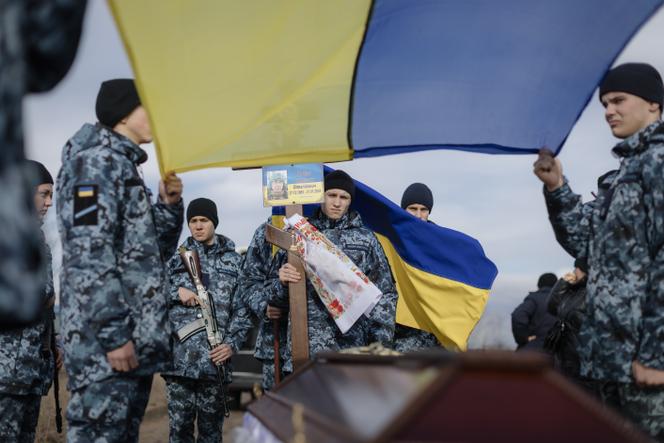


Oksana Melenko acts as a link between the front and the rear. A former communications officer for the town of Chernivtsi, Melenko now spends all her time working on the repatriation of soldiers' bodies originally from this town in western Ukraine. "It's getting worse and worse," she said, sitting at her office in the town hall on Wednesday, February 14, after describing a recent funeral to bury the DNA-identified body parts of a fighter whose remains had already been buried a year earlier.
Two years after the start of the Russian invasion, part of her job is also to adapt public space to the reality of war. This involves standardizing commemorative plaques, enlarging the central cemetery, and renaming some streets in honor of soldiers. She admits, however, that in Chernivtsi "people don't feel the war because they are not in immediate danger."
With its crowded streets full of restaurants and cafés, this charming town of 260,000 pre-war residents appears unaffected by the conflict that is tearing Ukraine apart from east to south. And yet, it is precisely in this apparent tranquility of cities far from the front that the country's resilience is being tested. "There are optimists and pessimists," said Anna-Maria Dzyk, 38, who arrived from Kyiv at the start of the Russian invasion with her two children, Nestor and Tyhon, and whose husband is fighting in the army. "I'm one of the optimists and I still see volunteers, committed people," she continued. "And I didn't think there would be so many, I must say. And then there are others who don't care about the war and aren't even interested in our cultural war [with Russia]."
The more time passes, the greater the strain on national unity. For the Ukrainian state, the challenge of the moment is to mobilize men to replace the dead and wounded. The situation has been critical enough in recent months for mothers and wives of servicemen to stage weekly demonstrations in major cities demanding the return of their loved ones, exhausted after two years at the front.
This renewal – imperative in the face of Russia's far superior human resources – is currently under debate in the Ukrainian parliament, the Verkhovna Rada, after the first reading of a highly unpopular bill on February 7. The bill, which is likely to be amended, provides for tougher penalties for draft dodgers, simpler enrolment procedures, and a lowering of the compulsory age of enlistment from 27 to 25.
But there is still uncertainty over the question of demobilization after 36 months – one of the most eagerly-awaited measures, given that the current term of service is unlimited. For some, the fact that the decision to demobilize remains subject to the authorization of the military command would in practice provide no guarantee.
You have 56.72% of this article left to read. The rest is for subscribers only.
